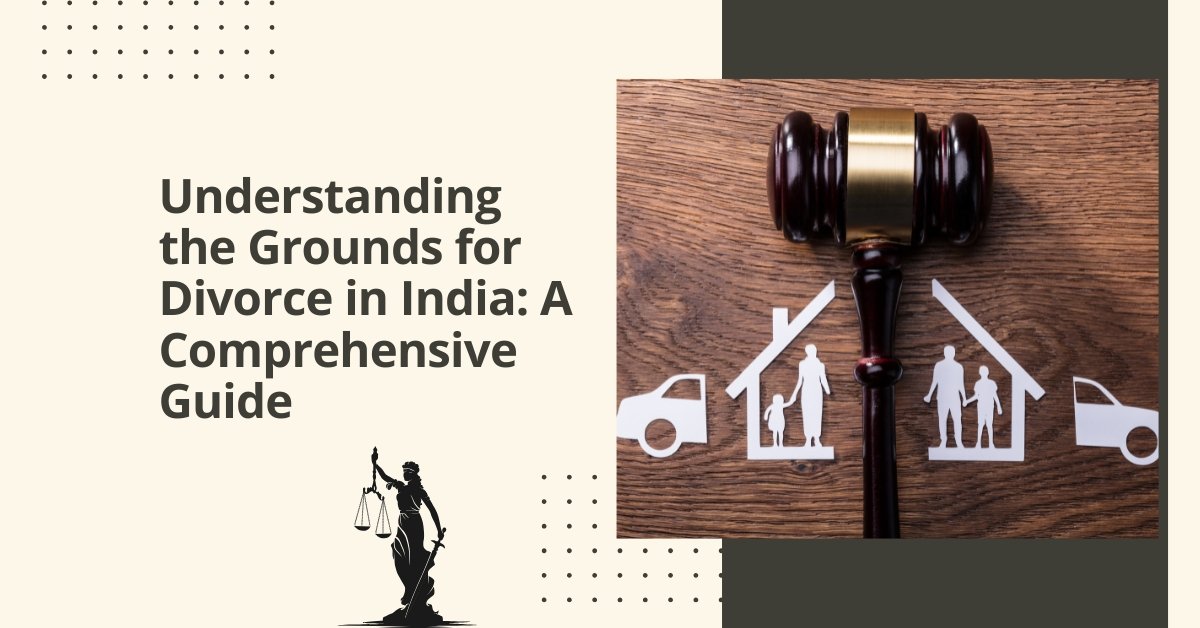Understanding the Grounds for Divorce in India: A Comprehensive Guide
Divorce is a sensitive and complex topic that many individuals may face at some point in their lives. In India, divorce laws are governed by different statutes depending on the religion of the individuals involved. Understanding the grounds for divorce in India is crucial, as it provides clarity on the legal requirements and the process that needs to be followed. In this blog post, we will explore the grounds for divorce in India, highlighting the various laws and their implications.
Types of Divorce Laws in India
India has a diverse legal framework for divorce, and it differs based on the religion of the couple. The primary divorce laws in India are as follows:
1. Hindu Marriage Act, 1955
Applicable to Hindus, Buddhists, Jains, and Sikhs.
2. Special Marriage Act, 1954
Applies to all Indian citizens, irrespective of religion.
3. Indian Divorce Act, 1869
Governs divorce for Christians.
4. Muslim Personal Law (Shariat) Application Act, 1937
Applicable to Muslims.
5. Parsi Marriage and Divorce Act, 1936
Governs divorce for Parsis.
Each of these laws defines specific grounds for divorce, which vary depending on the legal framework under which the marriage falls. Let’s take a closer look at the grounds for divorce under some of these major laws.
Grounds for Divorce under the Hindu Marriage Act, 1955
Under the Hindu Marriage Act, a marriage can be dissolved based on the following grounds:
1. Adultery
Adultery is a ground for divorce when one spouse has engaged in a voluntary sexual relationship outside the marriage. If proven, the innocent spouse can file for divorce. It is important to note that adultery must be proven in court for it to serve as a legitimate ground.
2. Cruelty
Cruelty is one of the most commonly cited grounds for divorce. It involves physical, mental, or emotional abuse by one spouse towards the other. Cruelty can take many forms, such as physical violence, constant humiliation, or emotional abuse, making the marriage intolerable for the other spouse.
3. Desertion
Desertion occurs when one spouse abandons the other without any reasonable cause or consent for a continuous period of two years or more. If a spouse deserts their partner without justification or consent, the abandoned spouse may file for divorce on these grounds.
4. Mental Disorder
If a spouse suffers from a severe mental disorder, such as being unable to understand the nature of the marriage, it can serve as a valid ground for divorce. The condition must be permanent and leave the person incapable of fulfilling marital obligations.
5. Conversion to Another Religion
If one spouse converts to another religion and abandons the Hindu faith, the other spouse may file for divorce on the grounds of religious conversion.
6. Leprosy
If one spouse suffers from incurable leprosy or a similar chronic disease that makes life with the affected spouse difficult, the other spouse may file for divorce. This ground, however, requires medical evidence and confirmation.
7. Venereal Disease
If a spouse contracts a sexually transmitted disease that is not curable, the other spouse has the right to file for divorce under this ground. The condition should be serious enough to make marital relations difficult.
8. Inability to Procreate
If a spouse is impotent and unable to consummate the marriage, the other spouse may seek divorce on this ground. Impotence must be proven medically, and the inability must be incurable.
Grounds for Divorce under the Special Marriage Act, 1954
The Special Marriage Act allows interfaith and intercaste marriages, and it has its own set of grounds for divorce. Some of the grounds under this act are:
1. Adultery
Just like under the Hindu Marriage Act, adultery is a valid ground for divorce under the Special Marriage Act.
2. Desertion
Desertion for a period of at least two years is a ground for divorce under this Act as well.
3. Cruelty
Cruelty, whether physical or mental, is a valid ground for divorce under this Act.
4. Incurable Mental Disorder
If one spouse is suffering from a severe mental disorder, rendering them incapable of performing marital duties, divorce can be sought.
5. Failure to Fulfill Marital Obligations
If one spouse fails to fulfill the basic marital obligations, such as providing companionship and emotional support, the other spouse may seek divorce.
6. Inability to Procreate
Inability to consummate the marriage is another valid ground for divorce under the Special Marriage Act.
Grounds for Divorce under the Indian Divorce Act, 1869
For Christians, divorce is governed by the Indian Divorce Act. The grounds for divorce are as follows:
1. Adultery
Adultery remains a valid ground for divorce under this Act. The spouse must prove that the other has committed adultery, which makes the marriage untenable.
2. Cruelty
Cruelty, whether physical or mental, is considered a ground for divorce for Christian couples as well.
3. Desertion
Desertion for a period of two years or more is a valid ground under this Act.
4. Separation for a Period of Two Years
If the couple has been living separately for two years or more, either spouse can file for divorce under this law.
5. Incurable Disease or Mental Disorder
A spouse suffering from an incurable mental disorder or disease, making marital life difficult, is grounds for divorce under this Act.
Grounds for Divorce under Muslim Law
Muslim law allows divorce through different forms such as Talaq, Khula, and Faskh. The grounds for divorce under Muslim law include:
1. Adultery
If a spouse commits adultery, the other spouse may file for divorce.
2. Cruelty and Abuse
Cruelty or abuse is one of the main grounds for divorce in Muslim law, particularly in cases where the behavior becomes intolerable.
3. Inability to Provide Maintenance
If the husband fails to provide maintenance to his wife, she can file for divorce.
4. Desertion
If the husband deserts his wife for a period of more than 4 years, it can be grounds for divorce.
5. Inability to Fulfill Marital Obligations
If the husband fails to fulfill marital obligations, the wife may initiate divorce proceedings.
Divorce in India: Know Your Rights and Legal Grounds
If you’re navigating the challenging process of divorce, understanding your legal rights is crucial. Consulting with a best divorce lawyer in Pune can provide you with expert guidance to ensure your case is handled effectively, safeguarding your interests throughout the proceedings.
Most Recent Posts
- All Posts
- Child Custody
- Criminal
- Divorce
- Family
- Law
- Property
Category
Explore Our Services
Empower Your Future with Expert Legal Guidance. Consult with Leading Divorce Lawyers at Adv.Mayur N. Gajbhiye for Professional, Compassionate Representation, Ensuring a Smooth and Informed Legal Journey.








